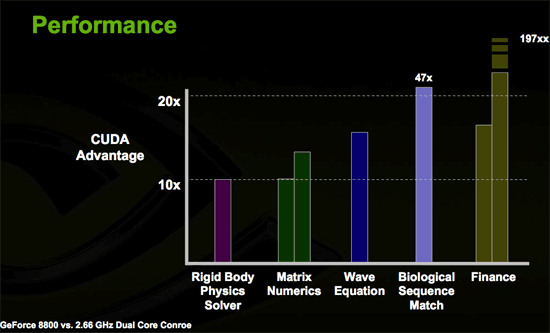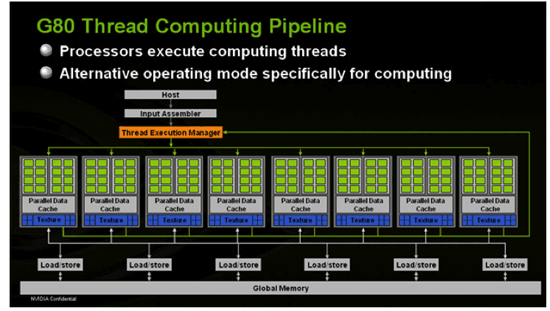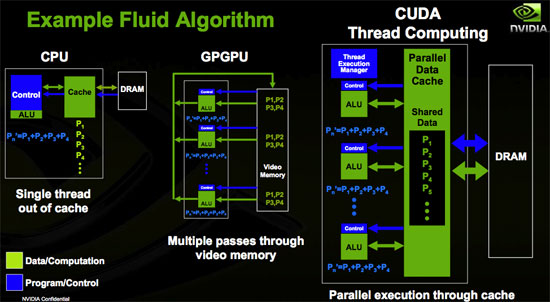NVIDIA's GeForce 8800 (G80): GPUs Re-architected for DirectX 10
by Anand Lal Shimpi & Derek Wilson on November 8, 2006 6:01 PM EST- Posted in
- GPUs
General Purpose Processing
With all the talk about how general purpose G80 is, can we expect it to replace our shiny new quad core desktop processor? This isn't quite possible at this point due to the way most general purpose code uses the CPU. Many dependencies and low parallelism prevent NVIDIA from simply dropping this in a motherboard and running Windows on it.
But there are general purpose tasks that lend themselves well to the parallelism of G80, and NVIDIA is enabling developers to take advantage of this via a technology they call CUDA (Compute Unified Device Architecture).
The major thing to take away from this is that NVIDIA will have a C compiler that is able to generate code targeted at their architecture. We aren't talking about some OpenGL code manipulated to use graphics hardware for math. This will be C code written like a developer would write C.
A programmer will be able to treat G80 like a hugely parallel data processing engine. Applications that require massively parallel compute power will see huge speed up when running on G80 as compared to the CPU. This includes financial analysis, matrix manipulation, physics processing, and all manner of scientific computations.

NVIDIA has written a totally separate driver for G80 that will be used to run compiled C code targeted at G80. The reason they've done this is because the usage model for GPGPU programming is so different from that of graphics. Both the graphics driver and the CUDA driver can be running on G80 at the same time. This may allow programmers to take advantage of CUDA for in game physics on a single card. The driver changes the conceptual layout of the GPU into something that looks more like this:

This design, along with stream output capabilities, allows programmers to treat the GPU like a general purpose data processing engine. Each block of 16 SPs is able to share data with each other and can perform multiple passes on the data without having to write out and read back in from the onboard graphics memory. Developers are given the ability to manage the caches themselves.

Will NVIDIA make an x86 CPU? Most likely not, but we may see NVIDIA produce even more general purpose CPUs for the handheld, CE, integrated markets. NVIDIA may end up becoming a producer of system on a chip solutions utilizing its graphics technology and simply expanding G80 to be more general purpose (and obviously get rid of some of the SPs in order to lower costs).










111 Comments
View All Comments
dwalton - Thursday, November 9, 2006 - link
When using older cards sacrificing IQ for performance is typically acceptable. Who needs AA when running F.E.A.R on a 9700 Pro.However, on a just launched high-end card, why would anyone feel the need to sacrifice IQ for performance? Some may say resolution over AA, but I find it hard to believe that there is a lot of gaming enthusiasts with deep pockets, who play with insane resolutions yet no AA.
JarredWalton - Thursday, November 9, 2006 - link
If I look for jaggies, I see them. On most games, however, they don't bother me much at all. Running at native resolution on LCDs or at a really high resolution on CRTs, I'd take that over a lower res with 4xAA. If you have the power to enable 4xAA, great, but I'm certainly not one to suggest it's required. I'd rather be able to enable vsync without a massive performance hit (i.e. stay above 60 FPS) than worry about jaggies. Personal preference.munim - Wednesday, November 8, 2006 - link
"With the latest 1.09 patch, F.E.A.R. has gained multi-core support,"Where is this?
JarredWalton - Wednesday, November 8, 2006 - link
I wrote that, but it may be incorrect. I'm trying to get in contact with Gary to find out if I'm just being delusional about Quad Core support. Maybe it's NDA still? Hmmm.... nothing to see here!JarredWalton - Wednesday, November 8, 2006 - link
Okay, it's the 1.08 patch, and that is what was tested. Since we didn't use a quad core CPU I don't know if it will actually help or not -- something to look at in the future.Nelsieus - Wednesday, November 8, 2006 - link
I haven't even finished reading it yet, but so far, this is the most comprehensive, in-depth review I've seen on G80 and I just wanted to mention that beforehand.:)
GhandiInstinct - Wednesday, November 8, 2006 - link
What upcoming games will be the first to be fully made on DX10 structure? And does the G80 have full support of DX10?timmiser - Thursday, November 9, 2006 - link
Microsoft Flight Simulator X will be DX10 compliant via a planned patch once Vista comes out.JarredWalton - Wednesday, November 8, 2006 - link
All DX10 hardware will be full DX10 (see pages 2-4). As for games that will be DX10 ready, Halo 2 for Vista will be for sure. Beyond that... I don't know for sure. As we've explained a bit, DX10 will require Vista, so anything launching before Vista will likely not be DX10 compliant.shabby - Wednesday, November 8, 2006 - link
They're re-doing a dx8 game in dx10? You gotta be kidding me, whats the point? You cant polish a turd.